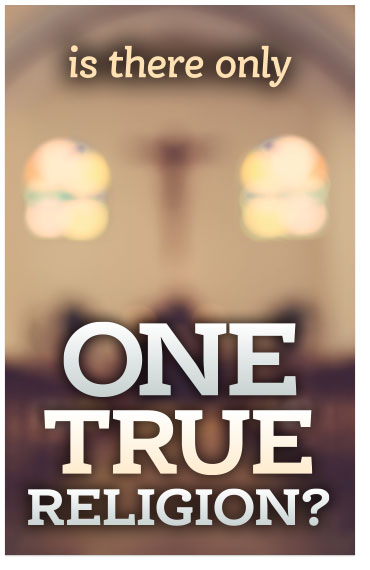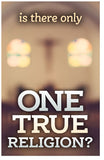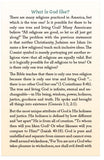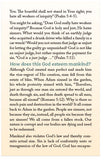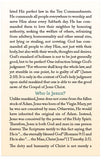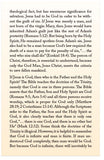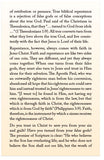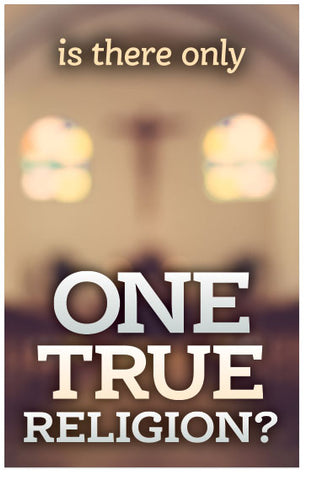Is There Only One True Religion?
Special-Order Folded Tract
 NOTE: This item is custom-printed to order (click for more details).
NOTE: This item is custom-printed to order (click for more details).
This tract is from our print-on-demand library, and is not kept in stock. Select the options below, and we will custom-print a batch just for you. Because this item is custom-printed, you can add your custom imprint to the back page at no extra cost.
- Estimated shipping date: Thursday, December 4 (Click for more details)
- SKU:
- Discounts: Discount coupons do not apply to this item
- Format: Folded Tract
- Size: 3.5 inches x 5.5 inches
- Pages: 8
- Imprinting: Available with 5 lines of custom text
- Version: NKJV
- Returns: Because this item is custom-printed to order, it cannot be returned.
Show all item details
The full text of this tract is shown below in the NKJV version. (Do you want to print this tract in a different version than the one listed? Contact us and let us know what you're looking for—we may be able to create the alternate version for you at no charge.)
What is God like?
There are many religions practiced in America, but which is the true one? Is it possible for there to be only one true and living God? Many Americans believe “All religions are good, so let us all just get along!” The problem with the previous statement is that neither Christianity, Judaism nor Islam (to name a few religions) teach such inclusive ideas. The Coexist symbol is merely portraying yet another religious view: that all religions are equally valid. But is it logically possible for all religions to be true? Or is there only one true religion?
The Bible teaches that there is only one true religion because there is only one true and living God: “... there is no other God but one” (1 Corinthians 8:4b). The true and living God is infinite, eternal and unchangeable—in His being, wisdom, power, holiness, justice, goodness and truth. He spoke and brought all things into existence (Genesis 1:1; 2:1).
But the most unique attribute of God is His holiness and justice. His holiness is defined by how different and “set apart” He is from all of creation. “To whom then will you liken God? Or what likeness will you compare to Him?” (Isaiah 40:18). God is pure and undefiled and separate from sinners and cannot even dwell around wickedness, “For You are not a God who takes pleasure in wickedness, nor shall evil dwell with You. The boastful shall not stand in Your sight; you hate all workers of iniquity” (Psalm 5:4-5).
You might be asking, “Does God really hate workers of iniquity?” Because God is holy and just, He hates sinners. What would you think of an earthly judge who acquitted a drunk driver who killed a family in a car wreck? Would you not esteem that judge as unjust for letting the guilty go unpunished? God is not like an unjust judge, but rather requires the payment for sin. “God is a just judge …” (Psalm 7:11).
How does this God esteem mankind?
Although God created man perfect and made him the vice-regent of His creation, man fell from this estate of bliss. When Adam sinned in the garden, his whole posterity sinned with him, “Therefore, just as through one man sin entered the world, and death through sin, and thus death spread to all men, because all sinned” (Romans 5:12). Why is there so much pain and destruction in the world? It all comes back to Adam in the garden. People are sinners, not because they sin, instead, all people sin because they are sinners! We all come from a fallen stock. Our nature is corrupt and our bodies are dying and need to be redeemed.
Mankind also violates God’s law and thereby commits actual sins. Sin is lack of conformity unto or transgression of the law of God. God has encapsulated His perfect law in the Ten Commandments. He commands all people everywhere to worship and serve Him alone every Sabbath day. He has commanded them to love their neighbor by honoring authority, seeking the welfare of others, refraining from adultery, homosexuality and other sexual sins, not lying or stealing, not coveting. God has commanded all people to obey Him, not just with their body, but also with their words, thoughts and desires. God’s standard of holiness is not to be just generally good, but to be perfect! One infraction brings God’s judgment: “For whoever shall keep the whole law, and yet stumble in one point, he is guilty of all” (James 2:10). It is only in the context of God’s holy judgment upon sinful mankind that one is able to see the good news of the Gospel of Jesus Christ.
Who is Jesus?
Unlike mankind, Jesus does not come from the fallen stock of Adam. Jesus was born of the Virgin Mary, yet he was not conceived by man. Otherwise, He would have inherited the original sin of Adam. Instead, Jesus was conceived by the power of the Holy Spirit. Therefore, Jesus is both God and man in one person forever. The Scriptures testify to this fact saying that He is “... the eternally blessed God” (Romans 9:5) and He is also “… the Man, Christ Jesus” (1 Timothy 2:5).
The deity and humanity of Christ is not merely a theological fact, but has enormous significance for salvation. Jesus had to be God in order to be without the guilt of sin. If Jesus was merely a man, and not born of the virgin Mary, then Jesus would have inherited Adam’s guilt just like the rest of Adam’s posterity (Romans 5:12). But being born by the Holy Spirit, He remained spotless from Adam’s sin. Jesus also had to be a man because God’s law required the death of a man to pay for the penalty of sin, “… the soul who sins shall die” (Ezekiel 18:4). The person of Christ, therefore, is essential to understand, because only the God Man, Jesus Christ, meets the criteria to save fallen mankind.
If Jesus is God, then who is the Father and the Holy Spirit? The Bible teaches the doctrine of the Trinity, namely that God is one in three persons. The Bible asserts that the Father, Son and Holy Spirit are God (Romans 9:5; Acts 5:4) and all three persons receive worship, which is proper for God only (Matthew 28:19; 2 Corinthians 13:14). Although the Scriptures refer to the Father, the Son and the Holy Spirit as God, it also clearly teaches that there is only one God, “… there is one God, and there is no other but He” (Mark 12:32). Some think the doctrine of the Trinity is illogical. However, it is helpful to remember that God is infinite and man is finite. If man understood God completely, then man would be God. But because God is infinite, there will inevitably be a measure of mystery. It is wise, then, to submit to the revelation God has given.
What did Jesus do?
Jesus saved His people from their sins by His obedient life and by His victory over death. First, Jesus obeyed the righteous requirements of the law. He never transgressed God’s law, and He also fully obeyed God’s law in thought, word and deed. “For Christ is the end of the law for righteousness …” (Romans 10:4). Secondly, Jesus also obeyed the penal sanctions of the law by giving His life. The death of Christ was a sacrifice for sin. Jesus’s death paid the price for sin and appeased God’s wrath towards sinners. Isaiah said concerning Jesus, “But He was wounded for our transgression, He was bruised for our iniquities … and the LORD has laid on Him the iniquity of us all” (Isaiah 53:5-6). Jesus did not only perfectly obey God’s law, but He also conquered death by rising again on the third day. Because Jesus rose again from the dead, all those who trust in Him have hope that they also will rise again from the dead. He now sits as ruler in heaven and will come again to judge the world on the final day as the King of Kings.
What is the response to Jesus?
God requires all men to turn from their false gods and to believe in Jesus as Lord and Savior. Repentance toward God is not merely sadness, nor is it acts of retribution or penance. True biblical repentance is a rejection of false gods or of false conceptions about the true God. Paul said of the Christians in Thessalonica, that they “… turned to God from idols …” (1 Thessalonians 1:9). All true converts turn from what they love above the true God, and live consistently with the fact that Jesus is Lord of their life.
Repentance, however, always comes with faith in Jesus Christ. Faith and repentance are like two sides of one coin. They are different, and yet they always come together. When one turns from their false gods, they must also turn to Jesus and trust in Him alone for their salvation. The Apostle Paul, who was an outwardly righteous man before his conversion, abandoned all hope that his righteous acts could save him and instead trusted in Jesus’ righteousness to save him. “[I want to] be found in Him, not having my own righteousness, which is from the law, but that which is through faith in Christ, the righteousness which is from God by faith” (Philippians 3:9). Faith, therefore, is the instrument by which a sinner receives the righteousness of Christ.
Do you trust in Christ to save you from your sin and guilt? Have you turned from your false gods? The promise of Scripture is clear: “He who believes in the Son has everlasting life; and he who does not believe the Son shall not see life, but the wrath of God abides on him” (John 3:36). Turn from your evil way, and trust in Christ!
What now?
Faith and repentance is not only the means by which a sinner is saved from the judgment of God, but it is also the rule by which a believer lives his whole life. If you are not a member of a local church, then your Lord Jesus commands you to do so. The significance of baptism is membership into the visible church: “Repent and … be baptized” (Acts 2:38). In addition, Jesus rules His people through elders and submission to a local church is part of repentance and faith in Jesus (Hebrews 13:17).
Gathering with God’s people is also a great blessing. At the worship service, one hears the preaching, singing and reading of God’s word, “which is able to build you up” (Acts 20:32). Therefore, do not only be saved from your sin, but use the means God has given His people to live the Christian life.
— Samuel Ketcham

